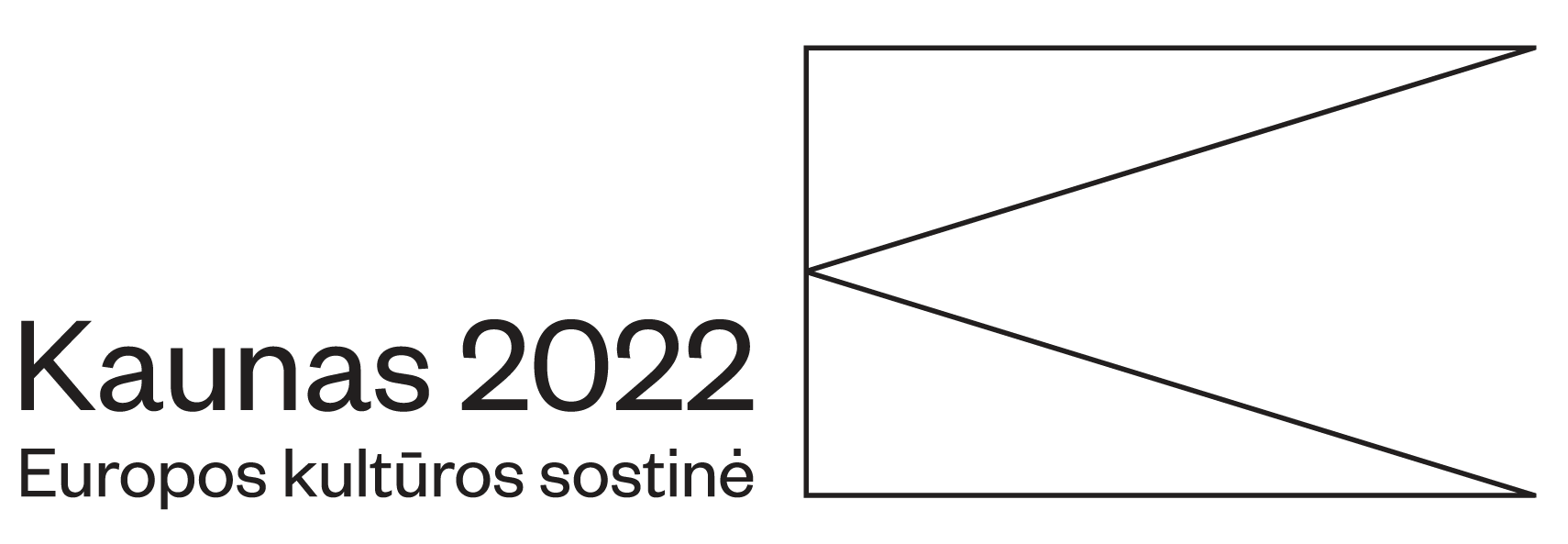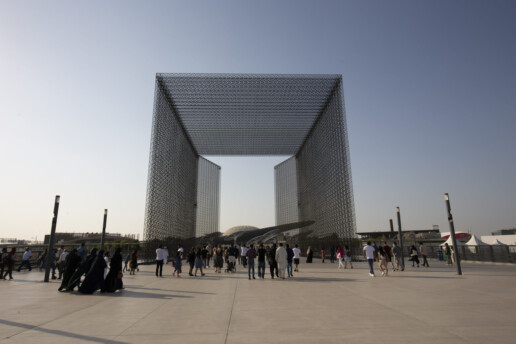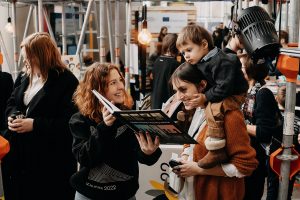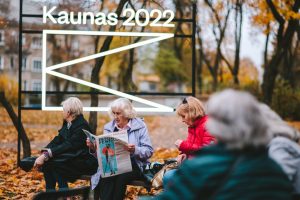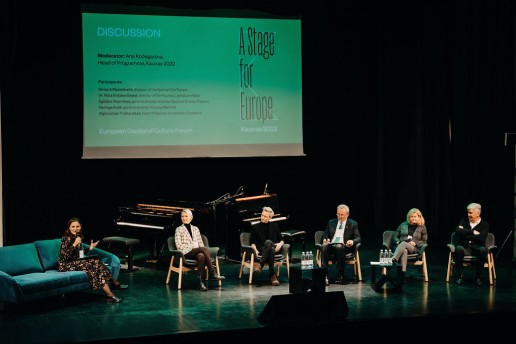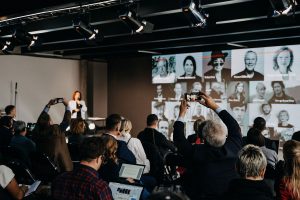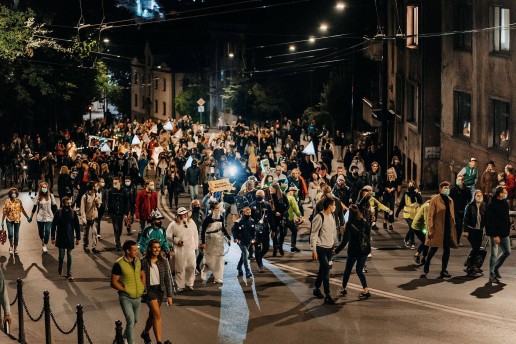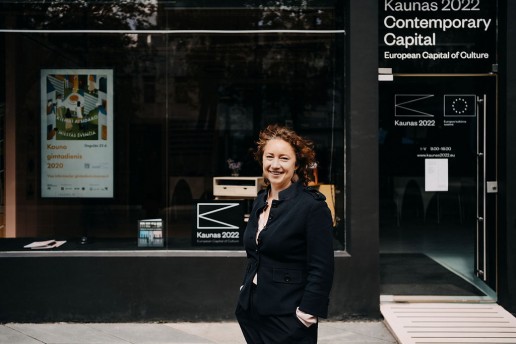Genius generates beauty: the experiences of the European Capitals of Culture at Expo 2020 Dubai
The “European Capitals of Culture Day at the Universal Exhibition 2020 Dubai” is an initiative that Matera-Basilicata 2019 Foundation is organising on the 30th October 2021 in the Italy Pavilion at the Expo of Dubai, in partnership with the Commissioner General of Italy and under the patronage of the European Commission. The event is of highly symbolic value considering the fact that it will see the European Capitals of Culture reunite for the first time at the biggest international event post pandemic. Taking its cue from the concept that inspired the Italy Pavilion itself, the initiative is designed to present the European Capitals of Culture that, with their enormous and varied potential of cultural experiences and practices, transform cities, generating beauty and inclusiveness.
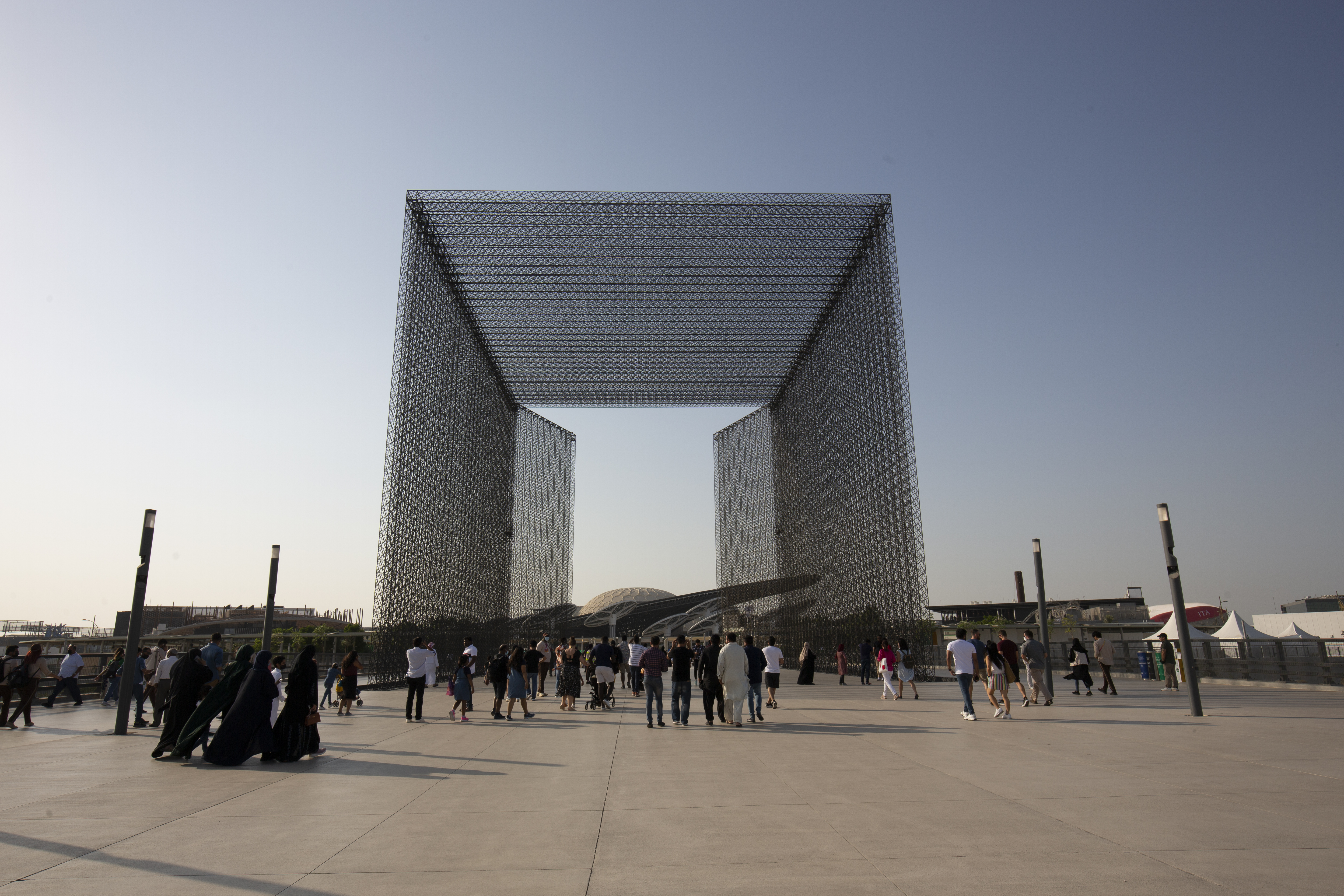
The day’s events will start at 11:00 am (9:00 am CET), in the Anfiteatro space, with an International Forum on “The European Capitals of Culture and the New European Bauhaus: how to build beautiful, sustainable, inclusive places”. The conference aims to bring to the fore the contribution of the Capitals to the New European Bauhaus, an innovative initiative launched by the European Commission aimed at fostering cooperation between thinkers and doers in imagining and creating places that are “beautiful for our eyes, minds and souls”. The examples that will be presented will show how the Capitals are redesigning our living spaces by bridging the worlds of culture and science, getting citizens involved, leaving no one behind and promoting accessibility. The conference, moderated by the RAI journalist Barbara Carfagna, will be opened by Paolo Glisenti, Commissioner General of the Italy Pavilion, followed by Benedetto Della Vedova, Deputy Foreign Minister, Barbara Gessler, Head of the “Creative Europe and ECoC programme” Unit - European Commission. Rossella Tarantino, Development and Relations Manager of Matera-Basilicata 2019 Foundation, will introduce the key topics of the Forum, followed by the keynote speaker Carlo Ratti, director of Senseable City Lab at MIT, who is also one of the designers of the Italy Pavilion. The European Capitals of Culture projects will be presented by Thierry Kruchten, Head of Tourism, Mobility and Sustainable Development - Esch 2022, Sara Vuletić, Programme Director - Novi Sad 2022, Dovilė Butnoriūtė, Head of International Relations- Kaunas 2022, Kaja Širok, Head of the EPICenter programme of a joint cross-border European Capital of Culture - Nova Gorica 2025, Rita Orlando, Project Manager at Open Design School of the Matera-Basilicata 2019 Foundation. Concluding remarks will be drawn by the Mayor of Matera, Domenico Bennardi.
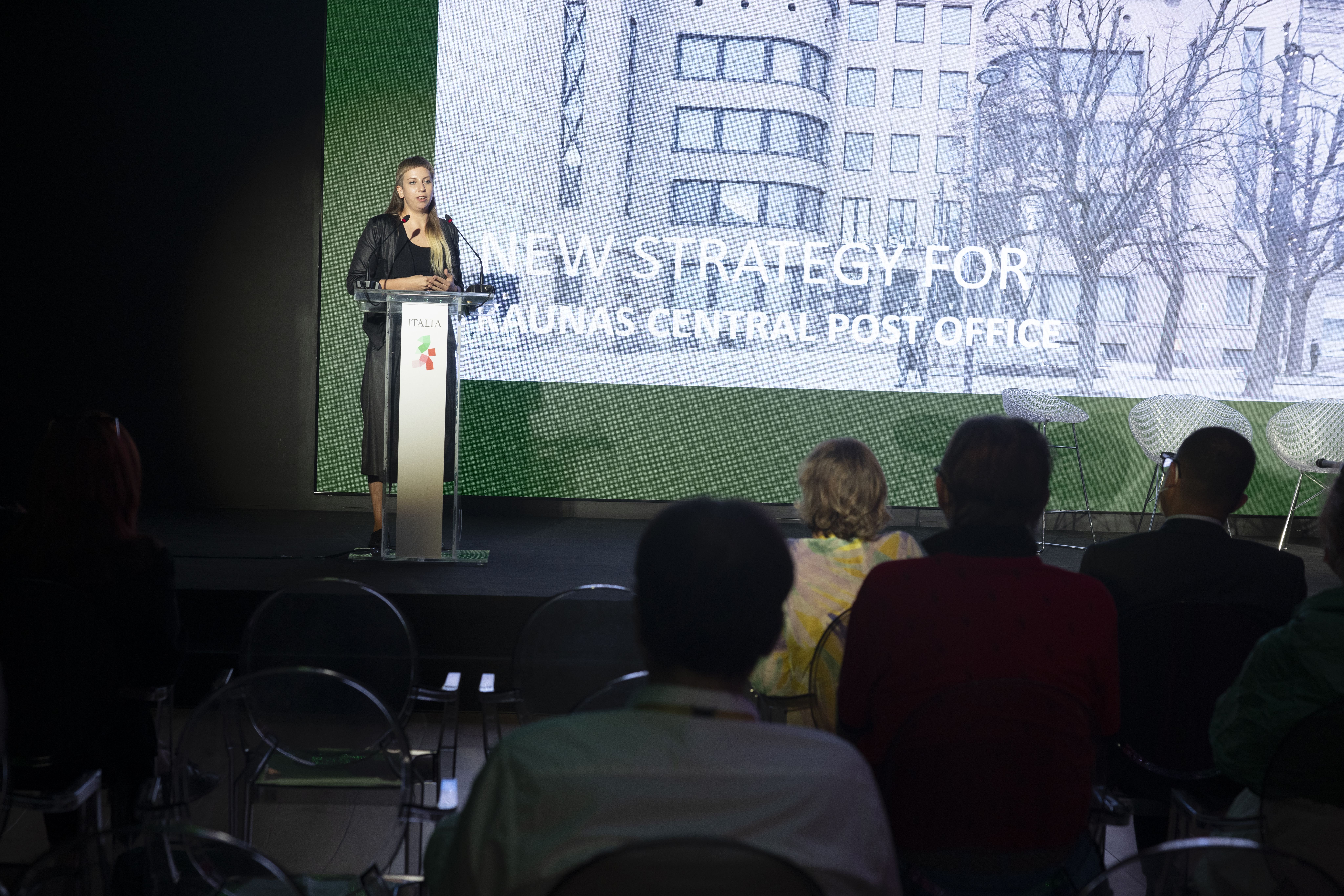
“Urban/rural: designing through culture new connections between overcrowded and sparsely populated areas” will be the focus of the second International Forum, scheduled for 4:00 pm (2:00 pm CET) in the Anfiteatro space. This conference will centre on several urgent issues raised by the pandemic, such as the need to imagine a more sustainable world based on a more balanced connection between these geographic areas, the role that culture can have in regenerating rural areas, overcoming stereotypes and building contemporary narratives about the resilient communities inhabiting these areas, and the “temporary citizenship” of artists and 21st century nomadic communities as a new way of repopulating these places.The Forum, opened by Rossella Tarantino and moderated by Beatriz Garcia, Associate Director of the Centre for Cultural Value at the Universityof Leeds, will host the following speakers: Chryssa Martini, Director of Premises & Infrastructure, Location Planning of the Artistic Programme - Eleusi 2022, Friderika Mike, Director of Programme Development - Veszprem Balaton 2023, Mika Vierimaa, Head of Administration- Oulu 2026, Giovanni Oliva, Director General of the Matera-Basilicata 2019 Foundation. The Mayor of Pietrapertosa, Maria Cavuoti, and the Mayor of Tricarico, Vincenzo Carbone, two of the Lucanian communities that still retain traces of Arab culture, will also be in attendance.
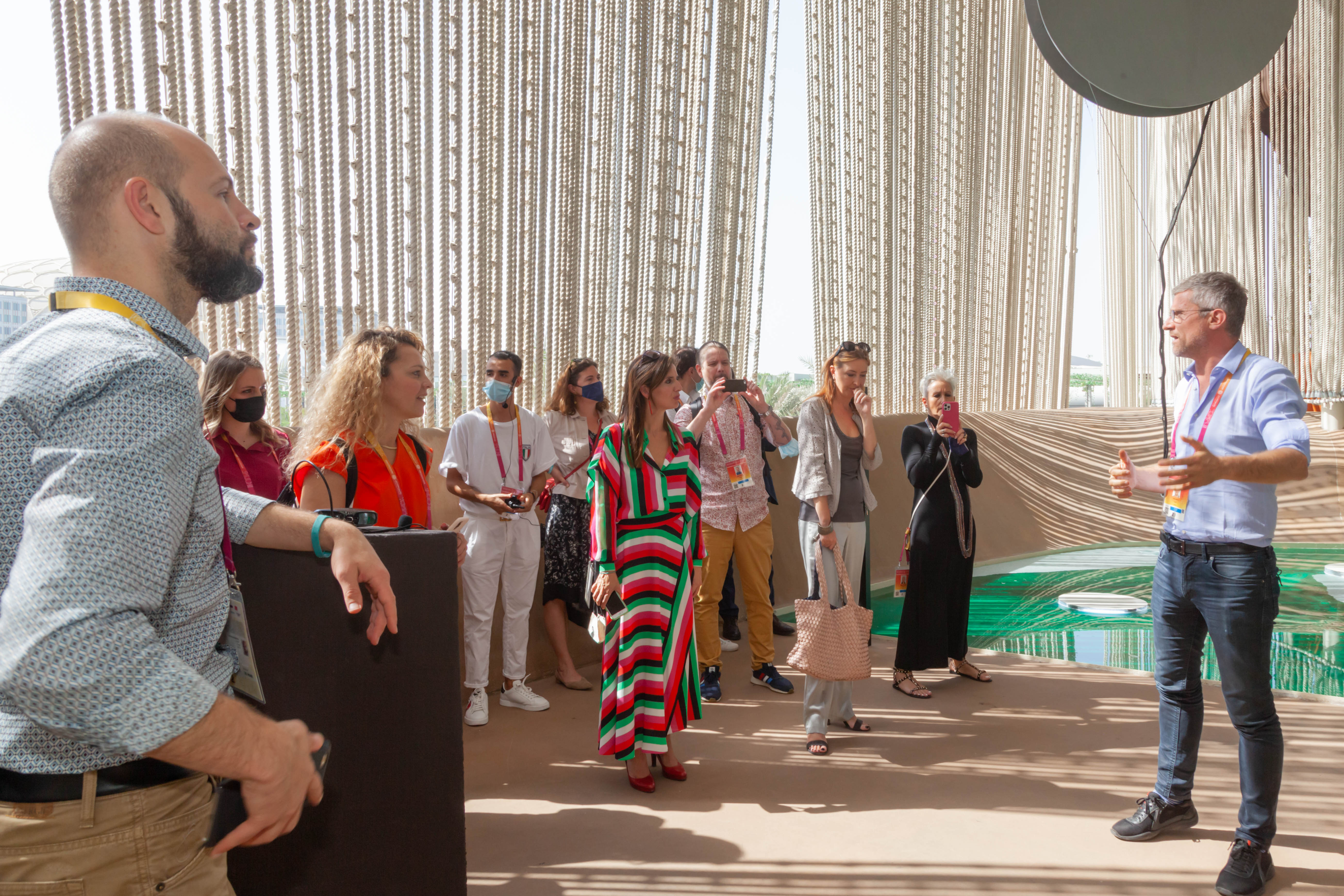
Both forums will be streamed on Italy Expo’s and Matera 2019’s Facebook pages, as well as on the pages of the European Capitals of Culture involved.
The Accademia space will be host to an event (with both a morning and afternoon session) called “The ECoC game”, a moving workshop on cultural geography developed by the Open Design School, a Matera-Basilicata 2019 Foundation initiative offering best practices at an international level in the field of new design practices, which has also become a partner of the New European Bauhaus. By playing live in an immersive and engaging way, Expo visitors will be able to embark on an imaginary journey into present and past European Capitals of Culture, in order to discover the highlights, curiosities and characters connected to the history of this project, which is fundamental to the lives of dozens of cities across the entire European continent.
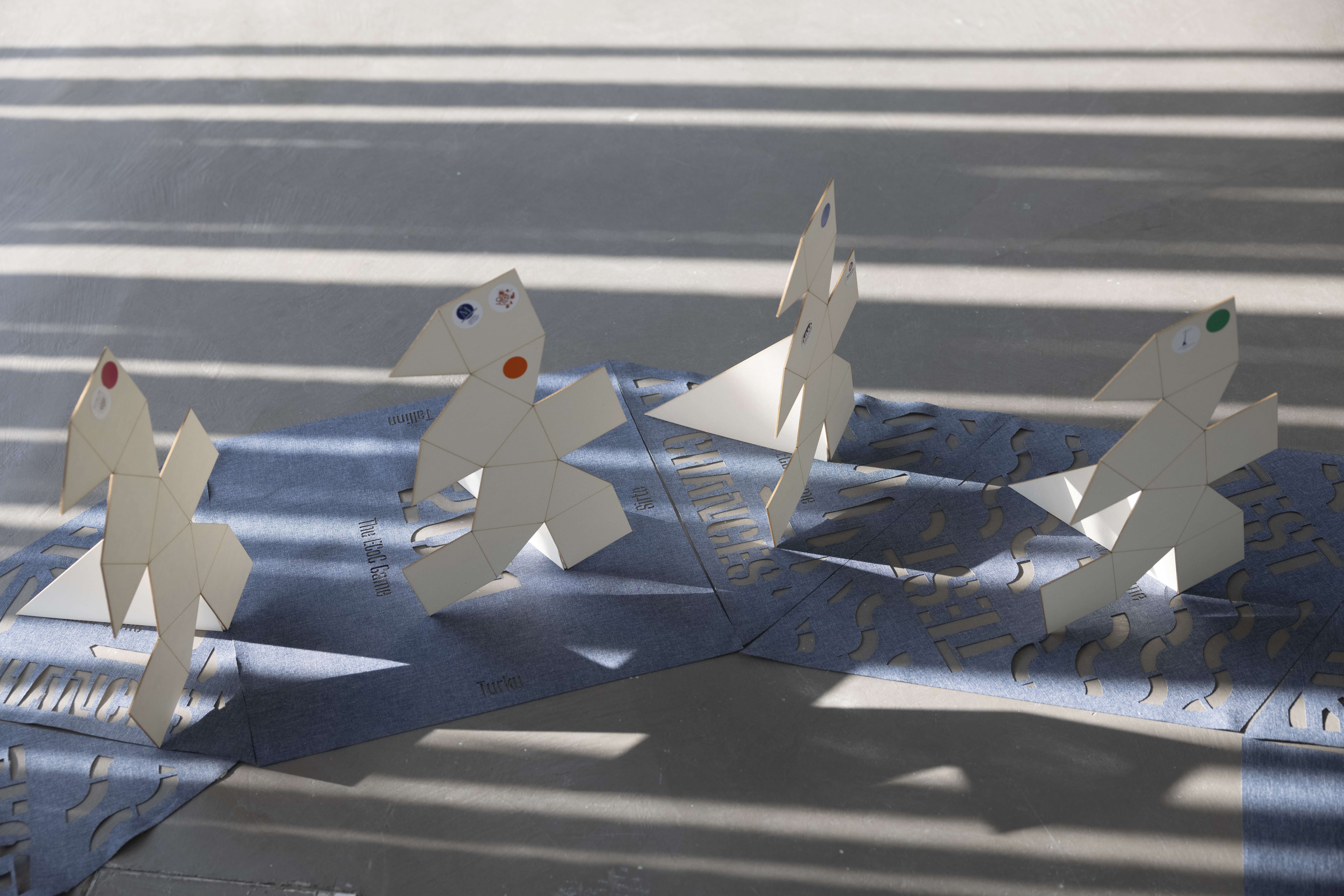
The day’s events will end in the Anfiteatro space at 6:30 pm with the performance of “Dubai Session”, presented by Open Sound, an original project by Multietnica, co-produced by the Foundation for the official programme of Matera European Capital of Culture 2019. The format creates new repertories and stages original collective performances based on the fusion of contemporary electronic music and traditional sounds, transforming a musical archive into a promise for the future. The performance designed for Expo 2020 will be a moment of acoustic dialogue which will offer a live return to the result of the artistic co-creation and cultural hybridisation with Arab culture, generated by the encounter between Gaetano Dragotta, known as go-Dratta (the producer), the Arab musician Imad Kawala (caval) and the traditional percussionists from Basilicata - Agostino Cortese (percussion and cupa cupa friction drum) and Alberico Larato (zampogna bagpipe and lyre). The event will open with the spoken DJ set “Road to Open Sound” by Alioscia Bisceglia, where he, in the dual role of performer and project ambassador, will narrate, using music and words, the genesis and journey of Open Sound from 2019 to today.
The Beast of Kaunas: A Myth for Every Day in 2022 and Beyond
2021-10-28Current Issues,News,media-news
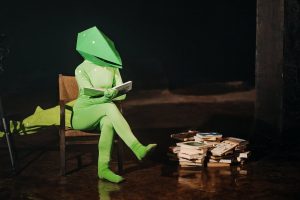
Kaunas Castle, 1st Fort of Kaunas Fortress, railway station and the bookshelves of little Kaunasians are just a few of many unexpected locations in which the Mythical Beast of Kaunas has already appeared since its official debut in 2019.
The main hero of the Contemporary Myth of Kaunas is also the mascot of ‘Kaunas – European Capital of Culture’ and the carrier of the project’s core ideas and values. It also happens to be quite a cute character drawn by illustrator Darius Petreikis. Rytis Zemkauskas, the curator of the Kaunas 2022 programme dedicated to the Mythical Beast of Kaunas, collected and put together all of the stories about the character travelling in the Sunny and Underworld Kaunas. Dozens of people chipped in with myths and legends about Kaunas they had heard – some of the contributors participated in creative writing workshops. At the same time, the rest of them just kept on walking, discovering and getting surprised, just like the co-created mythical character, a true European.
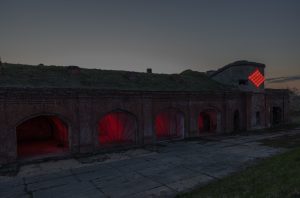
‘First and foremost, this programme is aimed at revealing the magical power of storytelling. Storytelling is an ancient tool that can shape a community, a city, a state. Myths and legends have always helped me to come together and be patriotic. Those coming from Ancient Greece inspired the contemporary European Union. The programme of the Mythical Beast of Kaunas has to offer a novel way of creating myths and legends right here and right now, using them as cultural tools. These are tools carrying values and encouraging empathy, community spirit, respect for each other, and tolerance. Every citizen is welcome to co-create them,’ Rytis Zemkauskas says.
The Mythical Beast of Kaunas was first seen in the Vilnius Book Fair in 2019 – this is where its fairytale book, created by Zemkauskas and Petreikis, was presented. The book is available in Lithuanian and English.
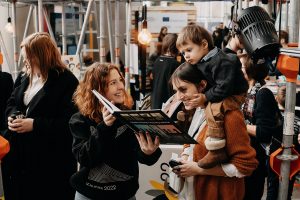
To Chill and Travel
An exciting encounter with the Beast awaits at the Kaunas Castle. With the help of talented composer Paulius Kilbauskas, the mythical creature found its bedroom below one of the oldest towers in Kaunas. His melodic snoring keeps surprising the visitors of the department of Kaunas City Museum and passers-by. Look for loopholes in the walls to ensure the best sound quality!
Yet another talented personality to collaborate with the Beast is Linas Kutavičius. Located in the Kaunas district, the 19th-century 1st fort of Kaunas fortress was brightened with light textures reminding the skin of a mysterious reptile. The new art installation by the light artist is a friendly gesture towards bats, animals that make up a significant population at the fort, and an invitation for people to (re)discover this historical object.
Did we mention that the Beast of Kaunas loves to travel? He made his appearance on a trolleybus as part of a mobile street art gallery some time ago; currently, portraits of his and his friends could be seen on a train wagon in the Kaunas Railway Station. Those approaching the wagon could also hear the tales of the Beast read by Rytis Zemkauskas.
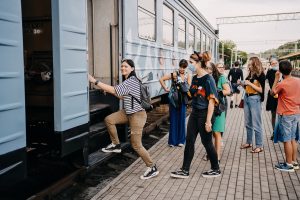
The Main act of Kaunas 2022
Since 1985, when the European Capital of Culture programme was launched, nobody has yet proposed a vision like this – to create a new myth for the city to help it change its path. The Mythical Beast of Kaunas – a project designed to create a unifying narrative for the city – will unfold in next year’s great mythical trilogy comprised of The Confusion (January 19–23), Confluence (May 20–22), and The Contract (November 25–27). The three main events are co-created by artists from Lithuania and abroad; they incorporate the ideas of historical personalities from Kaunas into the new work – as well as hints about the Beast. Will it finally have a physical body? One has to wait until 2022 and see…
Films and Games
The most kaunastic hero of all has already added a cinematic experience to its CV. Aideen Barry, an Irish artist, is working on a stop-motion animation film called ‘Pleats’ with a large team of artists, architecture professionals and modernism enthusiasts in Kaunas. The film, part of the Kaunas 2022 ‘Modernism for the Future’ program, will travel to international film festivals in 2022 – we can’t wait to see the Beast of Kaunas among the actors!
While ‘Pleats’ is still in post-production, one can already touch the Mythical Beast and go down its paths while learning the exciting secrets of Underground Kaunas in the limited-edition strategic board game. Created by a renowned Kaunas-based talent Urtis Šulinskas, the game has already found its place in the homes of many families, even those who have never been in Kaunas. Yet.
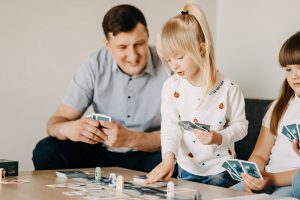
Another sweet addition to the Mythical Beast of Kaunas collection is a set of colourful pins created together with Kaunas city tourism, business, and investment development and international marketing agency Kaunas IN. Additionally, petrolheads are welcome to stick beastly magnets on their cars – the souvenirs fit fridges, too.
One can hear through the grapevine that the above mentioned are not the last souvenirs to please the fans of the Beast of Kaunas. Like most of the fantastic things in life, they will come unexpectedly. But here’s some gossip – have you ever wondered, for example, that Kaunas lacks its own perfume? The scent of a city is composed of various aromas, such as freshly baked goods, mamma’s lunch, wet asphalt, tree alleys, even petrol. The perfume of the Beast of Kaunas will be available before 2022.
The Future of the Beast
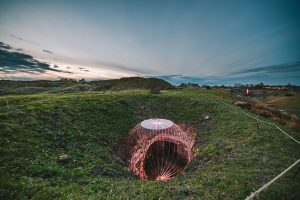
A city game offering a virtual reality experience is currently being developed – everyone will be able to play it online or by downloading a mobile app. The gigantic project will connect the myths and stories of the city and its characters with the essential cultural hotspots in Kaunas and Kaunas district and museum collections. The player will be able to visit historical locations in the area with the Beast as a guide.
Photographer Chiraqas Jindalas (IN / NZ) is working on a photo installation, ‘Underground Kaunas’, set to be opened in Autumn 2022. A unique technology involving negatives, scanning and lightboxes will provide the opportunity to see what’s below everyday Kaunas.
A total of three premieres by Kaunas State Puppet Theatre and Apeironas theatre from Klaipėda will reach the stage in 2022. The experiential and even therapeutical theatrical games will be used as tools to get to know the Beast of Kaunas and analyze its features.
The list of possible appearances of the Mythical Beast of Kaunas has no specific end. The character will add its charm to numerous events planned for 2022.
Next year, Kaunas and Kaunas district will become one big European stage and turn the city to a place where you will not escape culture. More than 40 festivals, 60 exhibitions, 250 performing arts events (of which more than 50 are premieres), and over 250 concerts are planned to take place in 2022. It is going to be the year-long non-stop biggest co-creative festival of all. Come co-create and celebrate with us!
Full programme: https://kaunas2022.eu/en/programme/
Kaunas 2022 memory program will build bridges between different cultures, religions and languages
2021-10-19Aktualijos,Current Issues,Memory office,media-news
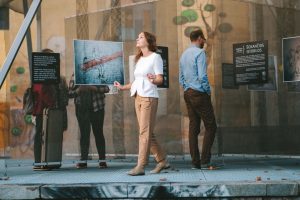
In 2022, the Kaunas 2022 program “Memory Office” will invite the audience to a year-long cultural research of Kaunas DNA. An extremely rich and multi-layered artistic program will lead to a brave confrontation with the city’s complex past like a mirror that helps you get to know yourself and your humanity better.
The program of events, which brings together creators from Lithuania and all over the world, plus a group of partners, will allow locals to get to know their city better, and for the visitors, it will become an atlas of new stories of Kaunas. World-renowned artists William Kentridge, Philip Miller, Jenny Kagan, the Sala-Manca Collective group of artists, and others will help to explore the city. The most important events in the city’s history, which shaped, changed and raised the city from the Second World War, the 1972 “Kaunas Spring” to the myths, stories and legends of the present-day city will be presented through exhibitions, concerts and performances.
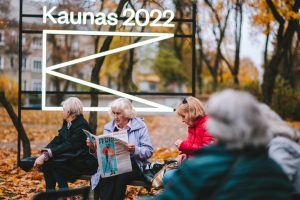
Extensive four months programme of the CityTelling Festival
The bigest event of the “Memory Office” program, the CityTelling Festival, which is already popular with visitors, will take place in 2022 for four months and will talk about the return and the community spirit. In this more than ever conflicted world, we will try to forge a new relationship not only with our painful history, but also with those who live next to us today. Extensive program of the festival includes stories of various forms that build bridges between different cultures, religions and languages. Stories that teach to empathize and listen to the Other.
The international program will invite to exhibitions, performances, concerts of internationally acclaimed artists, new routes created by city history enthusiasts and excursions to explore the different side of the city. The storytellers’ project “Where can I find you?” will spread around the city’s cafés, streets and courtyards, looking for everyone who wants to hear and share the stories of the modern world. Finally, the conference on the idea of Europe will raise one of the most pressing questions of today: what is Europe and what is our place in it?
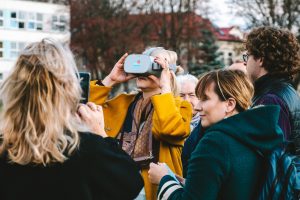
Special attention to the Jewish memory of Kaunas
The Memory Office program and the CityTelling Festival will pay special attention to the Jewish memory of the city. In 2022, the European Capital of Culture will invite Litvaks scattered all over the world to meet at the World Litvak Forum. On 29-30 September, in the program of discussions and culture, famous artists, scientists and representatives of the world of culture will talk about the Litvak identity, memory, and the role of culture in giving meaning to multicultural memory and creating new opportunities for dialogue.
One of the most anticipated events of Kaunas – European Capital of Culture 2022 is the work “Kaunas Cantata: Reconciliation” by composer Philip Miller and artist Jenny Kagan. The largest and most massive musical experience of Kaunas to date, dedicated to the symbolic reconciliation of nations, will be played during the Litvak Forum. More than 400 performers joined this piece of vocal instrumental music: local musicians and singers, choirs, representatives of different genres and generations.
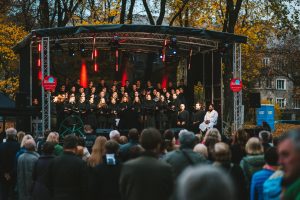
The major events of the four-month CityTelling Festival program are also dedicated to the Jewish theme – exhibitions, performances, musical stories, installations dedicated to the heritage of Jewish memory and cultural signs in the city spaces, and many other activities. Litvak artists who returned to Lithuania from the Republic of South Africa, Great Britain, France and Israel took a particularly active part in the development of the program. Main events: William Kentridge’s exhibition “What We Don’t Remember”, musical performance “Dybbuk”, Jenny Kagan’s exhibition “Out of the Darkness”, photography exhibition “The Last Litvaks”, art installation in public spaces “Threshold” and others.
The book “Kaunas Jews”, which will be released in Lithuanian and English languages this year, is no less important. This is the first such presentation of the Jewish history of Kaunas from the most important facts, concepts and names. This most comprehensive book on the subject to date does not seek to answer all the questions, but starting from the 15th century will consistently remind the contribution of Kaunas Jews to education, medicine, industry, business, culture and other areas of life, and will touch on the painful pages of history.
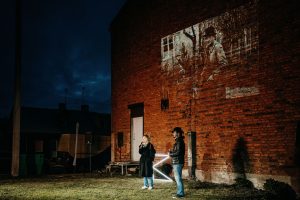
Events dedicated to the times of the disobedient and a different look at the city and its people
The special program of events will remind of the time that led to the biggest historical turning point in the life of the city. The nineteen-year-old Romas Kalanta who set himself on fire on 14 May 1972 and the events that followed led to the birth of the so-called “Kaunas Spring” – anti-Soviet protests that involved thousands of people and took place mainly in Laisvės alėja (Liberty Avenue). These events left traumatic traces not only in the further development of the city, in its cultural life, but also in the fates of a large number of young Kaunas residents. These historical events and the period of the disobedient will be revived within the Kaunas 2022 program through performances, exhibitions, concerts, discussions, meetings, etc. dedicated to this topic.
The crucial point of this program will be the exhibition “1972: Regime, Youth and Art”, in which paintings, photographs and films, documentary testimonies of musical life, youth fashion and other artefacts will tell about alternative culture and non-Soviet way of life in Soviet Lithuania. The exhibition will reveal the diversity of mindsets and creativity in the Soviet background that levelled everyone. It will explore how aesthetic tastes and ethical attitudes in Soviet times shaped different patterns of life and the atmosphere of disobedience to the government.
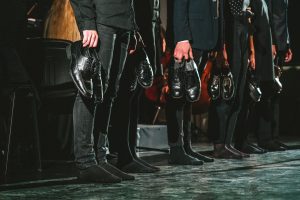
A series of events dedicated to the identity of the city will invite to look at the city and its residents from a different angle. We will examine the city, re-explore the city’s industrial heritage and histories of some factories. Perhaps the most interesting highlight of the program is the conversation between Kaunas and Vilnius about the confrontation between the two cities, the silent struggle and the mute dependence. In the exhibition, which will take place simultaneously in the two cities, MO museum together with Kaunas City Museum will remind how the big cities shaped each other and how modern Lithuania arose from the tensions between them.
Important events: Exhibition “1972: Regime, Youth and Art”, concert ” Made in Kaunas”, Historical-documentary performance “Kalanta”, rock opera “Kalanta”, exhibition “Kaunas – Vilnius: move the mountains”, route “Memory Circle”, exhibition “The Big Industry” and others.
Kaunas walls also tell stories
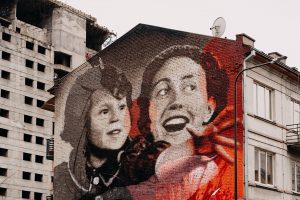
Kaunas and Kaunas district have been adorned with works of street art that bring back the faces of those who lived before us, tell their fates and present culture. This way, the poet Lea Goldberg , the charismatic Rosian with her mother Gerta, and the signs of the Tartar legacy returned to Kaunas again. The number of these meaningful wall drawings is increasing, so when wandering around Kaunas, Kulautuva or Kačerginė, don’t forget to look around and stop to read the inscriptions. Look for the special memory street art route at atmintiesvietos.lt.
And this is only a short look at the Kaunas – European Capital of Culture 2022 program “Memory Office”, which brings back the memory of the city’s ethnic communities.
Next year, Kaunas and Kaunas district will become one big European stage and turn the city to a place where you will not escape culture. More than 40 festivals, 60 exhibitions, 250 performing arts events (of which more than 50 are premieres), and over 250 concerts are planned to take place in 2022. It is going to be the year-long non-stop biggest co-creative festival of all. Come co-create and celebrate with us!
Full programme: https://kaunas2022.eu/en/programme/
Modernism for the Future'. Architecture as Inspiration for Cinema, Dance, Music and Beyond
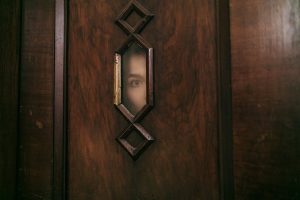
While becoming the European Capital of Culture is the most anticipated event in Kaunas, it's not the only one. The UNESCO World Heritage Commission now has to decide whether the modernist architecture network of Kaunas will be included in the prestigious global list of protected heritage. The acknowledgement would continue the list of international appreciations that already includes the European Heritage Label.
The step to UNESCO is a challenge not only for architecture and urbanism professionals but for every citizen of Kaunas and Kaunas district. This is where 'Modernism for the Future', one of the key programmes of Kaunas 2022, steps in. It aims to awaken the responsibility for our surroundings and create a solid emotional bond with the urban landscape and heritage.
How much modernism does Kaunas have?
During the Interwar Period, Kaunas and Kaunas District have become the epicentre of significant events in Lithuania and Europe. This period has left some 6000 buildings created in the modernist spirit.
These are not only buildings but also locations, ideas, authors, builders, and promoters. Their destinies, too. To have such a condensed heritage enriched by various individual stories and meanings is a great treasure. It is a living testament of history from the period of prosperity and modernisation that changed the everyday habits and coincided with significant changes in European and global cities, urban places and their residencies. Within a short period, modernism has become a dominating style of architecture. However, most of these buildings are in poor condition, forgotten, abandoned, or even empty today. 'Modernism for the Future', together with its extensive list of partners, aims to change this.
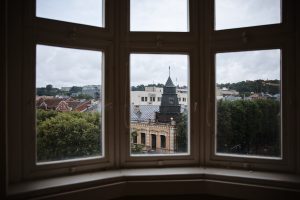
The first steps
'Modernism for the Future' is an open space for initiatives and meetings, welcoming professionals from various fields, building owners, heritage community and representatives of cultural initiatives for discussions, idea workshops, art and culture, which together create the strategy for preservation, interpretation and dissemination of modernist heritage.
Symbolically, the program chose to creatively enable 360 buildings in 365 days next year. The number 360 symbolises all possible perspectives of modernism: cultural, political, economical and more, whereas the number 365 asks us to notice everyday heritage.
The project includes the heritage community gathered on a website, collecting and sharing knowledge about modernist objects, their residents, and events of Kaunas and other Lithuanian and European cities. Dissemination of good practice, creative workshops, educational activities, as well as calls for artistic interpretations of modernism and art projects in modernist spaces are all part of the programme of the project.
The first international 'Modernism for the Future' conference took part in Kaunas in 2018. Two international summer schools have already been organised in the framework of the program. The first one explored downtown Kaunas; the second one took the students to the Kačerginė resort in the Kaunas district. In 2021 and 2022, the school is organised by the Kaunas University of Technology.
A unique movie for international audiences
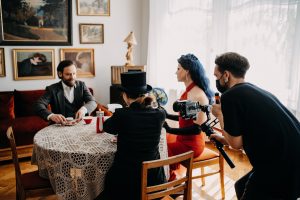
Probably the most unexpected idea of 'Modernism for the Future' is a film that will be premiered in international festivals. 'Pleats/Folds', directed by Irish artist Aideen Barry, tells the story of Kaunas modernism and its value for future generations with the help of stop motion animation. Students, volunteers, residents of modernist buildings, creative writing enthusiasts, dancers and even the Mythical Beast of Kaunas co-created the film.
'A video art project aimed at international audiences was considered already when preparing the bid for Kaunas 2022 – the initial idea was to include the local personalities in the story about the unique architecture of interwar Kaunas,' Viltė Migonytė-Petrulienė, the curator of 'Modernism of the Future', remembers. She explains that inviting Aideen Barry added ambition to the idea – the artist is known for paying a lot of attention to social topics, including local communities. The curator says, 'Pleats/Folds', a creative playground for the Kaunas and Kaunas district residents, is no exception. The filmmaking process included workshops of art as therapy, game and way of learning, while the result is as important as the path. It's a collective message to Europe and the world about the modernist Kaunas of the future, as well as its biggest treasure – the people that love the city.
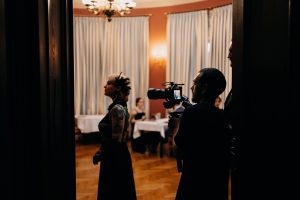
From electronic music to investigating shame
'Modernism for the Future' already has various collaborations with local and foreign partners lined up for 2022.
'MoFu 360/365' is a project financed by the European Union's programme 'Creative Europe 2014–2020' exploring connections with other European cities, from Eastern, Central to Western. Two-year project participants from Kaunas 2022 (Lithuania), Institute of Culture Strategy (Lviv, Ukraine), interdisciplinary arts centre 'Vaizard, z.ú.' (Brno, Czech Republic), regional development associations in the Kortrijk region and inter-governmental heritage organisation 'Intercommunale Leiedal' (Belgium) and partners in Tel Aviv (Israel) invite artists, together with local researchers and the heritage community, to create 17 artistic projects in modernist buildings.
The unique projects will strengthen the narrative of Europe's modernist heritage and will seek to reflect its contemporary significance for the global society. The project's final result will be presented at the opening weekend of the European Capital of Culture 2022 exhibition in the Kaunas Central Post Office. The exhibition will run for four months.
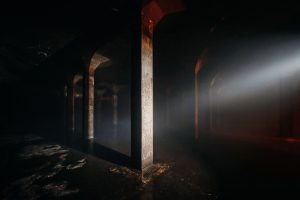
In 2022, the Kaunas territorial division of the historical Lithuanian Artists' Association will be launching the 100 Images of Kaunas project: a series of creative works and curated art exhibits located in 40 public and residential spaces of Kaunas and Kaunas District, built during the Interwar period.
The Reciprocal Residency Programme DeMo (Decoding Modernity) is an exchange programme during which the residents will have the opportunity to analyse the developmental processes of modernity in various social and cultural contexts. DeMo, a three-year programme (2020-2022) of Kaunas Artists' House, together with the Londonderry Center for Contemporary Art, the thankyouforcoming residency program in Nice, the Culture Center LAB in Novi Sad, and other partners invites artists, curators, researchers of the cultural field, and multidisciplinary collectives to explore potential connections, overlaps and divergences between the different forms and expressions of modernity.
The Kaunas division of the Lithuanian Union of Architects will be launching three projects in 2022 to analyse and creatively retell the history of Kaunas architecture during the 20th century. The first project, [In]visible Architecture by Rasa Chmieliauskaitė, aims to engage people with visual impairments in learning about their architectural environments through the use of new tactile tools. The second project, Architecture of Desire by Tautvydas Urbelis, is a continuation of international partnership with the Architecture of Shame project in Matera, Italy, in 2019. There, the artists analysed the expression of shame in local architecture. In Kaunas, the author will be presenting a creative interpretation related to the expressions of desire in spaces of Kaunas City. Additionally, the award-winning architect Gintaras Balčytis and his team will present an exciting program of Kaunas Architecture Festival that will include exhibitions, workshops and a forum.
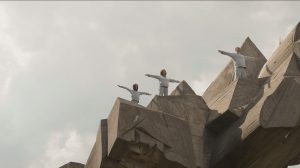
Good Music Live (Gera Muzika Gyvai in Lithuanian) aims to acquaint the Lithuanian audience with world music – a genre of music that embraces both modernity and traditionality by merging deeply-rooted traditions with the feelings and experiences of a modern person. In 2022, Good Music Live will be presenting the music programme World Music for Kaunas – a series of events in modernist buildings of Kaunas and Kaunas District, with concerts taking place all year round in apartments, public facilities and spaces built during the Interwar period.
Digital Tsunami, a platform for underground music, is organising a festival called Optimismo. It will celebrate modern electronic music and architecture, employing contemporary experimental music to reveal the relevance and value of modernist heritage and architecture in Kaunas. In 2022, Digital Tsunami will enrich the city's numerous spaces with a symbiosis of music and contemporary technological solutions.
Kaunas Dance Theatre AURA is the very first theatre of modern dance in Lithuania. Its project Pulsating Modernism of Kaunas by AURA includes a series of interactive guided excursions accompanied by live performances. Set to be initiated in 2022, the programme will provide the opportunity to get to know the modernism of Kaunas from a different point of view.
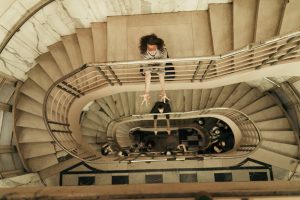
Kaunas Photography Gallery is currently organising a programme of residencies Photography – A Document for the Future, which will provide the opportunity to analyse and represent the modernism of Kaunas in an international context. The project will be welcoming residents from Germany, Scotland, the Netherlands and more to present their interpretations of Kaunas modernism.
The National M. K. Čiurlionis Museum of Art, known as the crown jewel of Kaunas modernism, also has several departments in other historical buildings of Kaunas, namely houses and apartments of interwar celebrities. The A. and P. Galaunė House-museum has already opened an exhibition, 'Arno Funk[tionalism]', dedicated to one of the busiest architects of the golden era of Kaunas.
'Modernism for the Future' is just one of many programmes of Kaunas 2022 that help Kaunas and Kaunas district to become a contemporary capital and one big European stage. In 2022, it will be a city where you cannot escape culture.
Full programme: https://kaunas2022.eu/en/programme/
European Capital of Culture Forum in Kaunas: Reflecting on Five Years of Creative Adventures, Lessons and Achievements
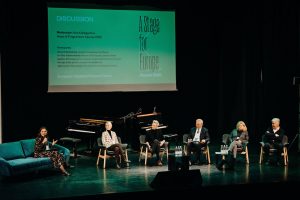
Next year’s European Capital of Culture (ECoC), Kaunas, has already caught the continent’s attention. On September 22–24, the team revealed a comprehensive programme for 2022 – the press conference was followed by a two-day forum full of captivating presentations, in-depth debates and artistic interventions. All of that helped to reveal the core ideas and values of the project and suggested 2022 will be one of the most successful years in the city’s history. An introduction to a new creative era, too. Once a temporary capital of a new state, today, Kaunas is ready to become a contemporary European capital.
‘I feel like five years ago when our team met the ECoC jury at the Ministry of Culture in Vilnius – we then promised the jury culture can make the much-needed change in people’s mindsets and help them better understand each other, as well as heal the city from its historical amnesia,’ Virginija Vitkienė, CEO of Kaunas 2022, reflected when opening the press conference ahead of the ECOC forum.
Partnerships that Enhance the Value of the City
‘Three years ago, we started the forum as an occasion and space to learn and get inspired from other cities, organisations, and innovators creating novelties in the cultural sphere. This year, it seemed more than natural after a few years of talking globally, we focus on Kaunas and speak in-depth about its programme’, Ana Kočegarova, Head of Programme at Kaunas 2022, opened the panel about the culture partnership programme. Kaunas 2022 accumulated around 80 partners that each helped shape the unique programme for next year.
‘An ECoC without helping hands is not ECoC’, Ana Kočegarova smiled. Among other partners that joined her on the stage was Gintarė Masteikaitė, culture manager, producer and head of ConTempo, the international performing arts festival making heads turn in Kaunas and Kaunas district since 2019. The culture professional believes ‘One of the key events initiated by Kaunas 2022 reveals the potential of performing arts and what we can do together; also, it supports independent artists who live here, or who left city and country and are now coming back. In general, art is a great tool to bring the world to Kaunas and Kaunas to the world.’
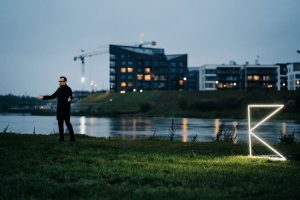
Memory Topics Crossing State Borders
Memory Office, one of the founding branches of Kaunas 2022, kicked off its session with guided tours in two of the most multi-layered areas of Kaunas, history-wise. During the walks, the programme’s curators presented the site-specific artworks initiated by the Memory Office that all prove the language of art as a way to tell the stories of people is a tool much more potent than pure facts.
Next year, the Memory Office will present a comprehensive programme in three parts, starting in spring, to commemorate the 50th anniversary of the unrest in Kaunas that followed the self-immolation of a 19-year-old student Romas Kalanta in protest against the Soviet regime. The events of 1972 will be reviewed in two theatre performances. Later on, the fourth CityTelling festival will grow into a month-long event. In autumn, World Litvak Forum will gather many people who have their roots in Lithuania to discuss the painful past and a shared future.
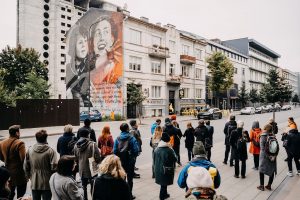
Architecture Heritage as Catalyst
Modernism for the Future is one of the most ambitious branches of Kaunas 2022, aiming at opening 360 interwar modernist architecture buildings in Kaunas and Kaunas district for visitors, ideas and events. The goal coincides with the architectural networks path to the UNESCO World Heritage List. Coincidentally or not, representatives of UNESCO attended the ECoC forum session held at the modernist auditorium of National M. K. Čiurlionis Museum of Art.
Within the framework of the Modernism for the Future programme, for more than five years and in various ways, cultural organisations, initiatives, architectural historians, and interdisciplinary art creators have been seeking inspiration in the city signs witnessing the birth of modern society, to tell Lithuania, Europe and the World. During the session, the programme’s partners revealed how Kaunas modernism can be Open and Accessible, Inclusive and Inspiring, Raising Awareness and Love to everyone for their future city.
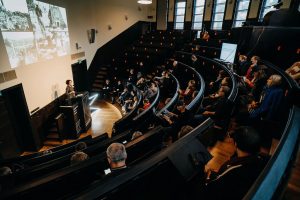
Understanding Oneself and the World Through a Myth
Possibly the most exciting session of the ECoC forum in Kaunas was held in the confluence of Lithuania’s main rivers, Nemunas and Neris, which is often called the birthplace of the city. Rytis Zemkauskas, the curator of the Myth of Kaunas, stressed we are what we tell and invited everyone to control the chaos by telling a common story: ‘Narrative places a human being within the time-space. Narrative helps to deal with the fear of infinity, it establishes, comforts and protects; The European capital of culture is aimed to create a uniting network of many different narratives – The Great Myth’. So, will creating a new myth for the city help it change its path? The answer will unfold in next year’s great mythical trilogy comprised of the Uprising (January 22), Confluence (May 20), and Treaty (November 25–27).
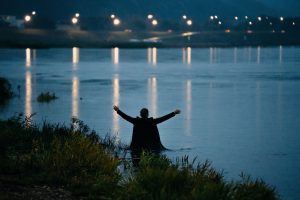
All as one Before and After
From traditional music sounds and crafts that spread over the terrace of Kaunas Cultural Centre during one of the last sessions of the ECoC forum to brave examples of contemporary art – all of the above is nurtured in the playground of the Kaunas 2022 community programme. Spanning through the numerous neighbourhoods of Kaunasand Kaunas district, the programme aims at revealing the multi-layered face of the region, combined from varied yet all significant features, legends, beliefs and wishes.
Celebrating the spirit of communion and co-creation are two of the key goals of Kaunas 2022. During the past five years, the activities brought impressive results: 1,300 cultural and artistic activities were organised, more than 18,000 participants took part, and more than 55,000 viewers enjoyed the content. More than 350 foreign and Lithuanian artists contributed to implementing the activities, and more than 70 long-term works of art were created. ‘The greatest outcome of value is a community that is curious and initiates changes in its living environment’, believe the programme’s curators. During the session, emotional stories about personal journeys were shared. Everyone was invited to set off on a journey through the co-created wonders of Kaunas and Kaunas district next year.
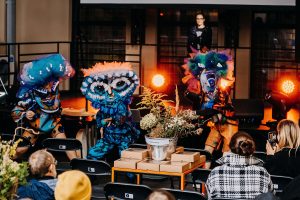
Design’s Role in Creating a Happy City
From audience development to a greener city, design as a tool is critical in every single aspect of Kaunas 2022. Design for Happiness, a programme striving for an accessible, happy and sustainable city, has been incorporated in the main idea since Kaunas started getting ready to become an ECoC. ‘It was clear ever since we started preparing the bid that we want Kaunas to be not only a city of modernist architecture but also a city of contemporary design,’ said Virginija Vitkienė, CEO of Kaunas 2022, when opening the session on Friday morning.
Together with partners, Virginija Vitkienė presented a lush tree of activities of Design for Happiness for those attending the event and watching the broadcast. The tools include a new accessibility guide for cultural institutions looking for new audiences, an old industrial ship in river Nemunas currently converted to an art hub, a successful collaboration with Kaunas’ fellow city in the UNESCO Creative Cities network, Kortrijk in Belgium, an overwhelmingly inspiring landscape design festival, the International Happiness Day and upcycling as a tool for creating sustainable fashion.
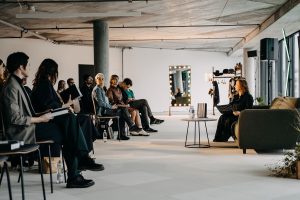
Emerging Kaunas: Goals for Years Following 2022
It would be very incorrect to say only professional artists and culture operators helped shape Kaunas 2022. The young generation of Kaunasians has been included in the path since the very start, with the help of the Emerging Kaunas programme, offering creative mentorships and workshops for high school students. The changes in the mindsets of the next generation were creatively and at the same time carefully transformed into the events of the programme of Kaunas 2022, highlights of which were revealed in the final session of the ECoC forum. Started with the rhythms of trap music, the event included personal growth stories, alternative initiatives and big future plans.
Next year, Emerging Kaunas will host the largest contemporary city festival "Audra” (Storm), based on the principles of co-creation and coined in cooperation with dozens of young producers, curators and the music club Lizdas. What happens next? The people Rising Kaunas will definitely come back in 2023 and the years to come.
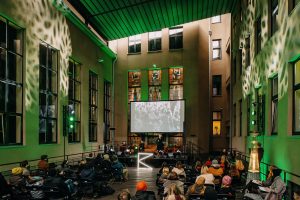
Hundreds of participants from across Europe attended the forum events, including representatives of former and future ECoCs, various institutions of art and culture and the press. Thousands of viewers watched the broadcast online – both real and virtual reactions became a true inspiration for the team of Kaunas 2022’. Video recordings of the presentations and the press conference are all available online on YouTube and Facebook.
Lithuania’s second-largest city Kaunas and the surrounding Kaunas district are ready to become one big European stage next year. The programme of Kaunas 2022 includes at least 40 festivals, over 60 exhibitions, more than 250 stage events (50+ world premieres!), and a number of concerts exceeding 250. The grand opening of ECoC is scheduled for January 22, 2022.
Text by: Kotryna Lingienė
Photos by: M. Plepys
All Eyes on Kaunas: Lithuanian City Revealed the European Capital of Culture 2022 Programme
2021-09-22Current Issues,News,media-news
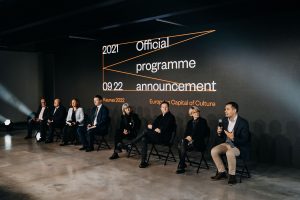
After twelve years of anticipation, the official title of European Capital of Culture is back in Lithuania. The country’s second-largest city Kaunas and the surrounding Kaunas district are ready to become one big European stage next year – the grand opening is scheduled for January 22, 2022.
The immersive formula for the big year includes at least 40 festivals, over 60 exhibitions, more than 250 stage events (50+ world premieres!), and a number of concerts exceeding 250. A press conference revealed key events, the most important names and many more exciting details for the whole continent to follow. Held in Kaunas, the event was accompanied by teams of Esch in Luxembourg and Novi Sad (Serbia), the other two European Capitals of Culture ready to shine in 2022.
Culture Beyond City Limits
It has been five years since the city of Kaunas and the surrounding Kaunas district have started preparing for 2022. The truth is, the ambitious international project has already proven its success. The change has taken place, and the communities that make up the face, body and soul of Kaunas have activated. Much of the European Capital of Culture program aims to celebrate the awakening and write a new chapter of the history of the area.
Dozens of unique small towns surrounding Kaunas, as well as lush nature and rich traditions that go back hundreds of years, are what complement the urban network within the city limits. At the same time, the international title has helped the rural communities meet international artists and discover new ways to express their identity.
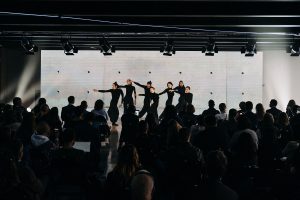
A Community Project Above Everything Else
The theme of Kaunas 2022 is a grand yet unified dama that gives meaning to the road to the awakening of the city and its people. It’s the biggest co-creation festival of all since day one – the majority of the time, ideas and finances is dedicated to bringing as many people closer to culture as possible. It’s also an educational project, as hundreds of culture professionals and enthusiasts and representatives of the young generation have already gained new skills, guaranteeing the project’s continuity and quality future for Kaunas and Kaunas District.
What also makes Kaunas 2022 unique is creating a new myth for the city to help it change its path. The Mythical Beast of Kaunas – a project designed to create a unifying narrative for the city – will unfold in next year’s great mythical trilogy comprised of the Uprising (January 22), Confluence (May 20), and Treaty (November 25–27).
The three main events are co-created by artists from Lithuania and abroad; they incorporate the ideas of historical personalities from Kaunas into the new work – names like George Maciunas and Emmanuel Levinas. Among the programme participants are Philip Miller, William Kentridge, Marina Abramović, Yoko Ono, Jenny Kagan, Robert Wilson, Mirga Gražinytė-Tyla, Antony Polonsky, Modestas Pitrėnas, Edgaras Montvidas and many others. It’s important to stress each branch of Kaunas 2022 has its own superstars, some of whom are still on their way to international fame – Kaunas and Kaunas District, as one big European stage, will become their trampoline.
Highlights of the Programme
Annual festivals already launched by Kaunas 2022 will reach their culmination, such as the International Day of Happiness (March), the European Capital of Culture Forum (May), Contemporary Neighbourhoods (all summer long in the towns of Kaunas district), the European Youth Festival (July), the international performing arts festival ConTempo (August), Fluxus Festival (September), landscape design festival Magenta (autumn), the CityTelling Festival, which reconsiders the multiethnic memory of Kaunas and the people who built it every October, and the Kaunas Design Event in celebration of its title as a UNESCO Creative City of Design (October). Talking about UNESCO, the Kaunas 2022 program called Modernism for the Future invites the residents and guests of the city to embrace the rich modernist architecture network and support its path to the World Heritage List.
Among the highlights of the event schedule in 2022 are the international exhibition of up-and-coming contemporary artists “MagiC Carpets Landed”, the 13th Kaunas Biennial “Once Upon Another Time”, an exhibition by William Kentridge, one of the most influential and most wanted international artists of today, a retrospective by the cult figure of New York art scene Yoko Ono, a show by the global superstar Marina Abramović, as well as works and performances by other fantastic names, often cooperating with each other and local artists or communities. New and very much anticipated events such as World Litvak Forum are also confirmed for 2022.
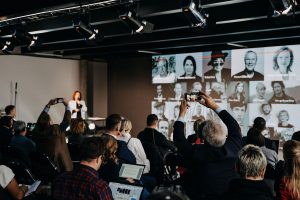
Cultural Bridges to the World
Artistic interventions, including two premieres, spiced up the mood of the press conference. Kaunas dance theatre ‘Aura’ presented an excerpt of ‘Pluto’, a new show depicting a journey through one’s identity by Matthew Dane Livingston.
Another premiere that received much attention was a new song ‘City Sisters’ by Lithuanian singer and Kaunas 2022 ambassador Jurga Šeduikytė and South African songwriter Kgomotso Le Roux. ‘City Sisters’ tells a story about two women in two countries – and Le Roux is singing her part in the Zulu language.
The cultural bridges built by the project of Kaunas 2022 helped even more creative ideas connecting Lithuania and SA to be born. The list includes an exhibition by William Kentridge, one of the most prominent contemporary artists whose roots are in Lithuania, coming to Kaunas next year. The South African artist explores the topics of violence, empathy and racism in his works – similar themes are reflected in the song ’City Sisters’, which will become a soundtrack to the exhibition. The premiere of the song’s music video will be held in both Kaunas and Johannesburg.
European Capital of Culture Forum for Extended Talks
The press conference in Kaunas is followed by the European Capital of Culture forum on September 23–24. Both live and online, the fourth international forum is dedicated to in-depth discussions and evaluation of the programme for next year. Curators and partners of the six main branches of Kaunas 2022 will present the vision for the city and the results of their five-year work, including the most significant achievements and the most important lessons that all influenced the final programme. Of course, it will be time to talk more about the key events in next year’s calendar.
The timetable of the forum: https://forumas.kaunas2022.eu/
Watch it live: https://www.youtube.com/c/Kaunas2022, https://forumas.kaunas2022.eu/ ir https://www.facebook.com/kaunas2022.
https://kaunas2022.eu/
Reverse mountain climbing? At the Fluxus Festival, it's also possible!
The largest and probably the most colorful community festival of Fluxus will happen in Kaunas on September 11th. This year's event will invite you to participate in discussions and immerse you into a co-creation full of fantasy - the festival participants will create and decorate their own costumes and the most unexpected vehicles to climb Parodos Hill in a Fluxus way.
Awakening the city in a Fluxus way since 2018, this year's event reflects the trailer of the year 2022, when Kaunas will become the European Capital of Culture and thus, the communities of Kaunas and Kaunas district invite you to celebrate all the holidays of the year. As for the culmination of the Fluxus Festival - the climb to the Parodos Hill - its organizers call for an inventive look - everything that the participants' imagination allows is possible. "You can climb walking backward or in a handstand, carrying an uncle or a goldfish, with rollerblades or a surfboard, or maybe just wearing a Santa Claus costume," said Simona Savickaitė, coordinator of the "Fluxus Labs! "program of Kaunas - European Capital of Culture 2022.
Due to the last year's pandemic, the Fluxus Festival didn't go as planned, but this year the communities will interact live, which, according to the organizers of the event, is a celebration in and of itself. "I am delighted that this community event is being created by more than 200 people from different social groups and beliefs, from students to seniors. This is the real Fluxus - after overcoming our fears, we are doing things that we may have never done before, we go on adventures," said S. Savickaitė. According to her, an event that would be more communal is probably unimaginable - all activities are created by the residents of Kaunas city and Kaunas district, and each of the activities invites the event participants to participate in co-creation. Simona is convinced "costumes of the festival liberate - by communicating, people start to form a unity."
The festival participants will meet in the square of the pioneer of the Fluxus movement - Jurgis Mačiūnas, and after climbing the mountain, get involved in the (un)expected and (extra)ordinary artistic action of Kaunas city and district communities. "It's all just a part of the Fluxus Festival. "Kaunas 2022 "community program "Fluxus Labs!" will invite you to celebrate the community spirit and turn this day into a real holiday of unity and friendship of all Kaunas and Kaunas district residents" said S. Savickaitė.
Get to know the entire Fluxus festival program:
2 PM - 4 PM Discussion about communities and their activities "Creativity and dialogue: changes in communities" ("Kodėl me?", Perkūno al. 4, Kaunas). The final lectures and discussions of the cycle "Creativity and Dialogue: Changes in Communities" organized by Kaunas 2022 community program "Fluxus Labs!".
5–9:30 PM Fluxus costume workshop - preparation for climbing the Parodos Hill (Kaunas Picture Gallery courtyard, K. Donelaičio str. 16, Kaunas). The organizers invite you to make a Fluxus costume. The necessary tools will be taken care of, but you can also bring your own.
5–9:30 PM Fluxus makeup and hairdressing workshop - preparation for climbing the Parodos Hill (Children's Literature Museum, K. Donelaičio str. 13, Kaunas). The organizers invite you to create Fluxus hairstyles and makeup. The necessary tools will be taken care of, but you can also bring your own.
5–9:30 PM Decoration workshop for Fluxus vehicles (scooters, bicycles, skateboards, etc.) - preparation for climbing the Parodos Hill (KTU University yard, K. Donelaičio 20, Kaunas). Organizers invite you to decorate your vehicles. Decorating tools will be taken care of, but you can also bring your own.
9:45 PM to 12:00 AM "Fluxus Festival" - climbing the Parodos Hill (J. Mačiūnas Square, K. Donelaičio St. 2, Kaunas).
"Fluxus Labs!" is part of the "Kaunas – European Capital of Culture 2022" program. In the European Capital of Culture year, events in Kaunas and Kaunas district are planned for more than a year: more than 40 festivals, over 60 exhibitions, more than 250 performing arts events, of which more than 50 premieres and more than 250 concerts.
Waiting for Kaunas2022, interview to the CEO Virginija Vitkienė
There are still a few months to Kaunas 2022, the great event that will see the second city of Lithuania take on the role of European Capital of Culture. The city has been preparing since 2017, when the candidacy was accepted. We met the CEO of the organization, Virginija Vitkienė.
In our interview she talks us about the program which is based on several interesting topics: from Modernist architecture, of which Kaunas is one of the main protagonists in Europe, to Memory, remembering the past and looking to the future, from Fluxus Labs which sees local communities personally involved in the various artistic events. Important to underline: each activity is studied and designed with local communities, especially with people who live in neighborhoods.
Watch the video:
[embedyt] https://www.youtube.com/watch?v=3-mtwGZ2asw[/embedyt]
Interview by: Marina Macrì, a journalist of "Lithuanian stories"
Photo by: M. Plepys
